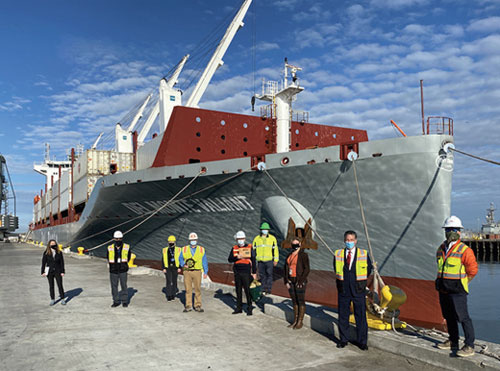Port of Hueneme Director Kristin Decas told AJOT, “We are very busy” after the Port saw a rebound in business following downturns related to the COVID virus in 2020. Decas expects volumes for autos to rise 1% and volumes for fruit to rise 3% over 2020 levels.

Auto Business Up 1%
Decas said the Port also has seen a major rise in its container volumes: “When I came to the Port in 2012, we were doing 400 containers per week. Since then, we have grown to 3,000 containers per week in 2021…. The port now has two stevedoring operations. One is run by Ceres and the other by Ports America. Together they operate 5 mobile harbor cranes of which 3 are hybrid-electric.”
New Low-Emission Liebherr Cranes For Ceres
Ceres recently acquired two new cranes, Liebherr – LHM 420 Litronic Mobile Harbor Crane models, which are each equipped with two electric motors installed opposite of the latest generation of Tier 4 final diesel engines, meeting the cleanest emissions standards of the EPA.
According to a Port press release: “Tier 4 engines significantly reduce emissions of particulate matter (PM) and nitrogen oxides (NOx) to near zero levels. Relative to previous emissions standards, Tier 4 engines reduce emissions by over 90%. These new cranes will plug into the Port’s new electric infrastructure coming online later this year.”
Decas said the growth of the container and auto business means that the Port is planning on building a parking garage to house cars before distribution and planning the acquisition of ship to shore gantry cranes to accommodate higher container volumes.
Import Containers of Fruits and Vegetables Growing
Decas said, “The growth of container business comes from Latin America and is composed of fruits and vegetables. Our volumes of fruits and vegetables are coming from Mexico, Central America and South America. These include bananas, avocados and blueberries which primarily come from Peru.”
The Port is seeing an expansion of warehouses outside the Port “and we distribute product to 15 states.”
Total fresh fruit shipments are projected to increase by 3% over 2020 levels, she said.
The container business is being generated by vessels operated by Del Monte, Chiquita and Sea Land.
New Energy-Efficient Del Monte Ships Arrive
On March 19th, the Port welcomed the first of two cutting-edge, energy-efficient Del Monte vessels. These ships are part of a new, six-vessel fleet — all have full cargo capacity of 1,276 twenty-foot equivalent units (TEUs) with 634 plugs for 40-foot-high cube reefer containers. The air-cooled containers will maintain the cargo at specified temperatures, traveling in reefer mode with multiple temperature variants from -25C to 40C. These features will help ensure that the produce ships, bringing bananas and pineapples to the Port, will arrive as fresh as possible, according to Del Monte.
“Del Monte is our longest-standing customer at the Port,” said Oxnard Harbor District President Jason T. Hodge. “This development shows 42 years of cooperation and collaboration between Del Monte and the Port of Hueneme, and we look forward to many more years of success.”
In addition to innovative design ensuring efficient fuel consumption, the ‘Valiant’ and her sister ships are fitted with environmentally beneficial features, including a hybrid scrubber system, which meets all international requirements to reduce pollution and control emissions of noxious substances, and shore power connection, so that the ships are zero emission while docked at the Port.
“We have been working towards this goal since 2017 and could not be more excited to see it come to fruition,” said Helmuth Lutty, senior vice president of shipping operations for Fresh Del Monte Produce. “As one of the world’s leading producer, marketer and distributer of fresh fruits and vegetables, we have set a very high bar for all the reefer containers and ships in our fleet. These six new vessels set the bar even higher, and allow us to deliver the high-quality fresh fruits and vegetables we are known for while meeting our sustainability goals.”
“Today, shipping accounts for the largest portion of our global energy use,” said Hans Sauter, chief sustainability officer of Fresh Del Monte Produce. “In 2018 we committed to lead by example and reduce our vessel emission by 10 percent. With the addition of these six new containers vessels, we are well on our way, estimating a savings of nearly 19 thousand metric tons of fuel each year.”
Decas said the Port is also developing an export business to Asia: “Sunkist transported citrus on 3 voyages to South Korea, so we are seeing some growth in exports to Asia, which we hope will expand.”





